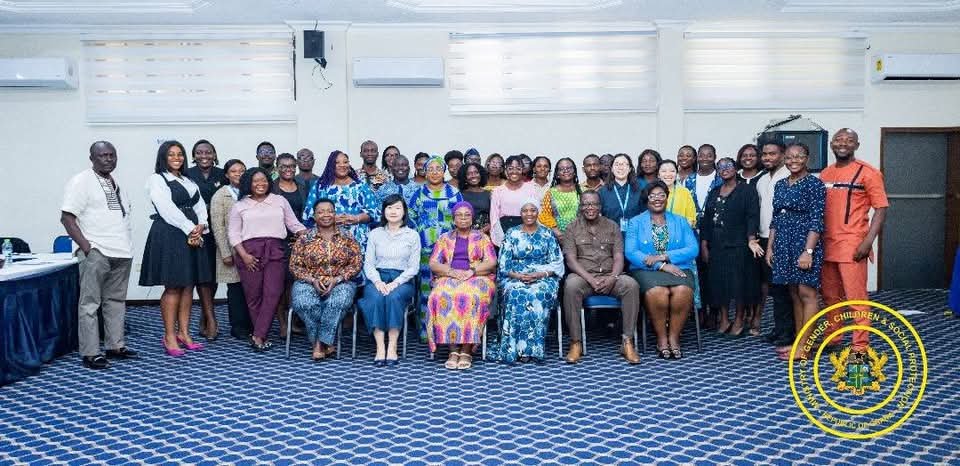News
Validation meeting on gender analysis of SBC interventions to end child marriage held

A validation meeting on the Gender Analysis of Social and Behaviour Change (SBC) programming for ending child marriage was held on Tuesday, April 8, 2025.
The meeting was organized by the Ministry of Gender, Children and Social Protection (MoGCSP), through its Child Marriage Unit, with support from UNICEF Ghana.
The event brought together key stakeholders from Metropolitan, Municipal and District Assemblies (MMDAs), the Commission on Human Rights and Administrative Justice (CHRAJ), UN agencies, civil society organizations, research institutions, and the media.
It served as a crucial platform to validate the findings of a recent gender analysis study commissioned under the UNFPA-UNICEF Global Programme to End Child Marriage.
In a welcome address delivered on behalf of the Ministry, the Head of the Child Marriage Unit, Madam Saphia Tamimu, underscored the importance of implementing gender-transformative approaches to eliminate child, early, and forced marriages.
She emphasized the need to ensure that Social and Behaviour Change programming reflects the lived experiences of girls and boys and empowers all actors, especially at the community level, to become agents of change.
The study under review focused on five key SBC interventions implemented across Ghana: the Ghanaians Against Child Abuse (GACA) social drive, the Child Protection Community Engagement Toolkit, Child Marriage-Free Community Alert Mapping, Engagement of Men and Boys Initiatives, and the Community Advocacy Toolkits.
The research team behind the study conducted 31 focus group discussions and 44 key informant interviews at various levels—community, district, and national—ensuring a diverse range of insights and perspectives.
The day’s agenda featured a series of engaging sessions including presentation of the study’s objectives, methodology, findings, and conclusions by the lead consultant, followed by a group work session where participants co-created actionable recommendations.
The meeting also featured a detailed presentation on the updated National Operational Monitoring and Evaluation Plan (2025–2026), with a focus on refining targets and indicators.
Participants deliberated on the study’s findings, refined recommendations, and built consensus to ensure ownership and effective integration into ongoing SBC efforts.
The meeting concluded with reflections on next steps for both the gender analysis and the revised M&E plan.
News
Prioritise affordable treatment of sickle cell treatment —Health Expert

Health experts have urged Ghana to prioritise affordable and accessible treatment for sickle cell disease (SCD) as advanced, but costly curative therapies remain out of reach.
SCD, an inherited blood disorder, affects about three in every 100 newborns in Ghana.
Globally, around 1,000 babies are born with the condition daily, with three-quarters in sub-Saharan Africa.
The disease causes severe complications including chronic pain, anaemia, infections, strokes and organ damage, often leading to shortened life expectancy.
In recent years, gene therapy has been developed as a potential cure.
However, its cost—running into millions of dollars per patient—makes it financially and technically inaccessible in Ghana.
According to Dr Lawrence Osei-Tutu, a Sickle Cell and Childhood Cancer Expert at the Komfo Anokye Teaching Hospital, “the country must instead focus on practical, lower-cost interventions such as hydroxyurea”, a decades-old cancer drug proven to reduce painful episodes, hospitalisation and life- threatening complications in SCD patients”.
Taken orally, the medicine improves red blood cell function and is considered safe and effective.
“Hydroxyurea therapy is as good as the cure and a low-hanging fruit to pluck, we must bring a cure to our sickle cell warriors, but do so sustainably.” he urged.
In a chat with The Spectator here, he said to create awareness on the disease, the expert noted that despite its benefits, “hydroxyurea is not widely accessible in Ghana.”
Stressing that, “many patients either cannot afford it or struggle with irregular supply through the health system.”
Moreover, he argued that scaling up access would provide immediate relief while the country builds the infrastructure, trains specialists and secures funding needed to support curative therapies in the future.
With an estimated 15,000 babies born with sickle cell disease annually in Ghana, Dr Osei Tutu cautioned that “failure to improve access to effective treatment will leave many patients vulnerable to preventable complications and early death.”
From Kingsley E. Hope, Kumasi
Join our WhatsApp Channel now!
https://whatsapp.com/channel/0029VbBElzjInlqHhl1aTU27
Hot!
Let’s reintroduce Cultural Studies to complement educational reforms — Tourism Minister

Madam Abla Dzifa Gomashie, the Minister of Tourism, Culture and Creative Arts, has emphasised the importance of reintroducing Cultural Studies in schools as part of Ghana’s broader educational reform agenda.
She said Cultural Studies would complement existing efforts to reposition Science, Technology, Engineering and Mathematics (STEM) and Technical Vocational Education and Training (TVET) to promote digital literacy and expand Creative Arts education.
Speaking at the 2025 Homowo Festival of the people of Ningo-Prampram, held on the theme: “Education: The Best Legacy for our Children,” Madam Gomashie said cultural education was critical to national identity and development.
She noted that the festival’s theme aligned with the Government’s vision to transform education in Ghana and encouraged the youth to embrace it not only as a means of personal development but also as a way of preserving traditional values.
These values, including patience, wisdom, and hard work, were at the core of the Homowo celebration, the Minister said.
“Cultural festivals like Homowo are vital instruments for strengthening cultural identity, preserving historical memory, and fostering national unity. Additionally, festivals serve as platforms for educating the youth through storytelling, music, dance, and other traditional practices, while also providing opportunities for community engagement.”
Madam Gomashie highlighted the strong foundation that Ghana’s tourism was built on, which included culture, traditions, and the creative industry, collectively contributing to over GH¢4.8 billion to the economy.
“Festivals give tourists reasons to visit our country. Therefore, with the right infrastructure and the development of all the domains, the sector can do more than what has been recorded,” she added.
Mr Sam Nartey George, the Member of Parliament for Ningo-Prampram and Minister of Communication, Digital Technology and Innovation, commended the community for their vibrant participation in the festival. He announced plans for the construction of a new nursing training school in Ningo, aimed at expanding access to healthcare education in the area.
Nene Osroagbo Djangmah XII, Paramount Chief of Great Ningo Traditional Area; King Dr Tackie Teiko Tsuru II, Ga Mantse; Nene Tetteh Wakah III, Paramount Chief of the Prampram Traditional Area; Prof. Odaifio Welentsi III, Paramount Chief of the Nungua Traditional Area; Naana Dugbakuwor Dugba II, Paramount Queen Mother of Great Ningo; and Mr. Elvis Afriyie Ankrah, Special Envoy on Religion and Inter-Faith Affairs, who represented the Chief of Staff, were among dignitaries at the festival. -GNA














